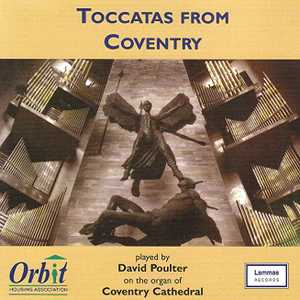Toccatas from Coventry

David Poulter on the Organ of Coventry Cathedral
The Prince of Denmark's March (Trumpet Voluntary) Jeremiah Clarke
Jesu, joy of man's desiring J S Bach
Arrival of the Queen of Sheba G F Handel
Te Deum (Hymne d'actions de grce) Jean Langlais
Andante No. 2 Louis James Alfred Lefébure-Wély
Fanfare Percy Whitlock
Nun danket alle Gott Sigfrid Karg-Elert
Sheep may safely graze J S Bach
Festival toccata Percy E Fletcher
Le banquet céleste Olivier Messiaen
Prelude on the Londonderry Air Noel Rawsthorne
Toccata (from Symphony No. 5) Charles-Marie Widor
Total playing time 73m 00s
Toccatas from Coventry
Toccatas from Coventry
The organ has the broadest repertoire of any instrument. As far back as the 15th Century right up to the present day, transcriptions of vocal and orchestral music form a major part of the organist's repertoire. Four of the works on this CD are transcriptions. Jeremiah Clarke's The Prince of Denmark's March is from a suite for trumpet and Handel's Arrival of the Queen of Sheba is from his oratorio Solomon (1749). Bach's Sheep may safely graze is an orchestral movement from the secular Cantata 208, whereas Jesu, joy of man's desiring is a movement for choir and orchestra from Cantata 147. One scholar has even suggested that Bach's famous Toccata and Fugue in D minor may have started life not as an organ work but as a piece for solo violin, and may not even be the work of Bach. Various elements of the style suggest that it is an early Bach organ work, influenced by the North German tradition of Buxtehude and his predecessors. After the strong rhetoric of the Toccata, the fugue soon breaks out of its straitjacket and becomes more rhapsodic.
The French symphonic organ built in the 19th Century possessed great power and a varied, colourful orchestral pallet. These instruments heralded a new school of organ composition, of which Charles-Marie Widor's Toccata is undoubtedly the best known example. This Toccata is from the Symphonie V (symphony here means suite) and achieved overnight popularity when it was played as the Postlude at the Wedding of the Duke and Duchess of Kent in 1961. In contrast to Widor, Lefébure-Wély was regarded by some of his contemporaries as a crude showman of a composer and organist. His gentle, pastoral Andante No. 2, however, shows a less bombastic side to his musical personality.
The symphonic organ tradition continues in France to this day. Olivier Messiaen's Le Banquet Céleste ("The Heavenly Banquet") may sound strikingly modern to some ears, but was actually written in 1928. It was one of the composer's first published works, and was ahead of its time in many ways. The slow tempo and the inertia of the harmony aim to depict eternity. In a very different musical vein is Jean Langlais' Te Deum. The plainsong themes are developed into a free, tripartite work, and the piece is brought to a cataclysmic conclusion based on the opening ideas.
Percy Whitlock's Fanfare and Folk Tune are typical of the lighter side of the English "pastoralist" school. The Folk Tune is memorably melodic (as is Noel Rawsthorne's simple Prelude on the Londonderry Air, based on the well-known tune of "O Danny Boy"), and the Fanfare is typically restrained, not least the serene and gently wistful middle section. Percy Fletcher's Festival Toccata is a much more extrovert piece. Fletcher worked as a conductor in various London theatres, and this probably explains the piece's garish character. Equally extrovert is Sigfrid Karg-Elert's Marche Triomphale sur Nun danket alle Gott. The Lutheran Chorale (the teutonic equivalent of the Anglican hymn tune) has been the inspiration for much German music over the course of the last few centuries. Karg-Elert's rousing march on this well known chorale is the musical mirror of the Coventry Cathedral organ: eclectic, vibrant and powerful.
Daniel Moult
David Poulter
Born in 1954, David Poulter was educated at King"s School, Rochester. He was a Foundation Scholar at The Royal College of Music and a Royal College of Organists "Limpus" prizewinner. He was Assistant Organist at Rochester Cathedral from 1976 to 1981 and, following a period as Head of Music at Tunbridge Wells Girls" Grammar School, he moved to Coventry Cathedral as Assistant Director of Music in 1990. He was appointed Director of Music at Coventry Cathedral in 1995. In April 1997, David Poulter succeeded Roger Fisher as Director of Music at Chester Cathedral.
Produced by Daniel Moult
Recorded and edited by Lance Andrews
Photograph by Ian Kerr